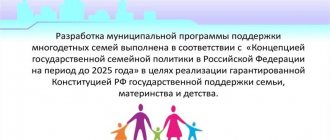Increasingly, families are choosing to raise more than two children, as the state is trying in various ways to increase the birth rate in the country. At the same time, federal legislation does not provide precise information about which families can be considered large. Therefore, citizens have to rely on the information contained in regional legislative acts. To do this, not only the number of children is taken into account, but also until the age of the children a large family retains its status.
How many children do you need?
What kind of family is considered to have many children? For this purpose, different requirements imposed by regional authorities are taken into account. Typically, this status is assigned to families with more than three children.
It is allowed for regional authorities to provide benefits to people who have only two children. Typically, such a policy is carried out in cities where there is a low birth rate, so the authorities try to motivate citizens in different ways.
How are children counted?
It is important to know until what age of children a large family can maintain its status. It is taken into account that all children must be minors, so the status is lost if even one of the three children reaches the age of 18.
There are exceptions, since if a child, after reaching adulthood, continues to study full-time at any university, then it is allowed to keep the status until he completes his studies or turns 23 years old.
In some regions, it is allowed to leave the status if an adult child serves in the army.
Age value and other criteria
Cultural and national traditions have a direct impact on family size. The age factor is no exception. In other words, to determine whether a family has many children or not, it is often necessary to resolve the question of up to what age the child is classified as a “children.”
The situation varies across the country: in some cases this age is determined at 16 years, in others – 18. In some subjects of the Russian Federation, the age can be extended through military service, in others - while studying in higher educational institutions, as well as in graduate school, residency.
The moment when a family ceases to have many children is determined primarily by the presence of children who have not reached a certain age. This age in each federal subject depends on local legislation.
In addition, other circumstances should be taken into account. When considering the question of how long a family will be considered large, the fact of the child’s death or deprivation of parental rights will be important.
If there are three children in a large family, then if one of them dies, it will no longer be considered such. However, if another child is adopted, such a family will again receive the corresponding status.
When considering whether a family is considered large if one child has died, one should proceed from the number of children that is necessary to meet the criteria for large families in the region.
This is important to know: Unemployment benefits for orphans
A similar situation occurs if the child reaches the age limit established by local law. For example, if in a region only persons under 18 years of age can be members of a large family, then when the eldest child turns 18, the family may lose its status.
If another child is born, then the total number of children whose age meets the requirements will again make it possible to obtain the status of having many children.
Which children are counted?
It is important to understand not only up to what age of children a family is considered to have many children, but also which children are taken into account. This includes children:
- native;
- officially adopted;
- for whom the parents have issued guardianship according to the general procedure;
- reception rooms;
- husband's stepdaughters.
In the last two cases, there may be exceptions in different regions, so citizens must independently find out information regarding the possibility of adding a particular child to the family.
Which children are left out?
Large family: how many children and what age should there be for this status? There must be at least three children under 18 years of age, but the following children are not included here:
- to which citizens were deprived of their rights;
- there are restrictions on rights;
- guardianship was formalized by persons other than the parents;
- brought up in orphanages or other government institutions;
- those who entered into an official marriage or were emancipated before reaching the age of 18;
- living in educational colonies;
- in respect of whom the adoption decision has been cancelled;
- dead.
Additionally, each region may take into account its own requirements regarding the age of children a large family can maintain its status, as well as under what conditions benefits are granted.
How to obtain a certificate for a large family at the MFC
Parents with many children or a parent, in order to confirm their status and take advantage of benefits, are required to obtain a special certificate; for residents of Moscow and Moscow Region there are separate types of document - for mothers and fathers of many children.
First of all, you need to collect the entire package of documents and make an appointment at the nearest branch of the MFC. If, after reading the article, you still have questions, you can first consult by toll-free phone or ask a lawyer online.
As soon as you get an appointment with a specialist, receive an application form; if necessary, ask for a sample filled out that is current for 2018.
After handing over all the documents to the employee, you will be given a receipt, by the number of which you can find out the status of your application.
Read also: How to sue a child from your wife?
What documents are needed
The list of mandatory documentation for obtaining a large family certificate includes:
- originals and copies of birth certificates of all children in the family (under 18 years of age);
- passports of parents, guardians and trustees, as well as children who were 14 years old at the time of submitting the application;
- color or black and white photographs of each of their parents, size 3 by 4 (check with a specialist whether it is possible to take a photograph in a specific “My Documents” center);
- original certificate of marriage or divorce;
- document confirming guardianship or adoption;
- for children from 16 to 18 years of age, a document confirming full-time education, and in regions where the family may include students under 23 years of age;
- certificate of family composition - can be issued at the MFC;
- if the parents are divorced, a formal agreement between the parties regarding the residence of the children is required.
Deadlines for registration
The time during which the social protection department will make a decision to recognize a family with many children is no more than 30 working days, and it may also take 1-2 days to send the finished certificate to the MFC.
Requirements for families
What kind of family is considered to have many children? As a standard, the same requirements are imposed on it in different regions:
- adults and children must be Russian citizens;
- the family must have official registration in the region where it is planned to receive various benefits and concessions from the state;
- citizens must raise the optimal number of children provided for by law;
- children must live together with their parents, and if adults decide to divorce, then the children must stay with someone else and live together with him;
- Even temporary residence of children in any educational institutions is not allowed, and it is also usually not allowed to maintain status if the child serves in the army.
Under certain conditions, people who have not yet reached the age of 18 are allowed to enter into an official marriage, but in this case they are not considered minors. A large family – how many children? There must be at least three children, all of whom must be minors.
Which family is considered to have many children?
Russian legislation does not have a clear definition of which family is considered to have many children. The right to determine the criteria for classifying a family as a large family is granted to regional authorities. It is generally accepted that a large family is one that has three or more children under 18 years of age.
In this case, not only natural children born in marriage are considered, but also adopted children, stepdaughters and stepsons. That is, for example, if a woman has a child from her first marriage and two children in a new marriage, then the spouses are already considered to have many children.
Important! If one of the three children is 18 years old, then the right to be considered a large family is lost. Moreover, if parents queued up for some program earlier, their place in the queue is reserved for them.
If adult children are studying full-time at a higher educational institution, then until they reach the age of 23, the family retains the status of a large family. That is, all benefits and privileges are preserved in the general manner.
If the spouses give birth to or adopt another child, the status of a large family is automatically extended.
The legislative framework
The Family Code does not define a large family, but there is a definition of who is considered a child. According to the law, a child is considered a citizen who has not reached the age of majority (18 years). The presidential decree “On measures for social support of large families” also does not fully disclose the meaning of the status, but it does define a list of benefits and privileges.
The only legal act that defines the concept of a large family is the National Standard of the Russian Federation “Social services for the population. Terms and Definitions". According to this document, a large family is one with more than three children.
Download for viewing and printing:
Important! Children whose parents have been deprived of parental rights in whole or in part, as well as those who are supported by the state (for example, live in orphanages or boarding schools) cannot be part of the family.
Do you need expert advice on this issue? Describe your problem and our lawyers will contact you as soon as possible.
Regional statistics
According to the presidential decree, the definition of a large family remains at the discretion of regional authorities. The majority adopted the National Standard as a basis, making minor changes.
For example, in Moscow and the region, only children who are under 16 years of age are taken into account, and when studying full-time at a higher educational institution - up to 18 years of age. In smaller regions - up to 18 and 23 years old, respectively.
Therefore, in order to understand whether a family is considered to have many children in a particular region, it is necessary to contact the Department of Social Protection of the Population at the place of residence or the local Administration.
Important! Some regions refuse to assign status to those spouses whose children have already reached the age of majority, but are studying full-time at universities. This is not a violation if it is specified in the administrative regulations for social support measures for a privileged category of citizens.
This is important to know: What payments are there if the husband goes on maternity leave?
How to register a status?
Having understood what a large family is, what requirements are imposed on it, as well as what assistance is provided from the state, you can start applying for the appropriate status. To do this, you need to contact the social security authorities of the region where citizens live.
To obtain this status, you need to prepare the following documentation:
- parents' passports;
- marriage certificate, if the parents have officially registered their relationship;
- certificate of family composition;
- Saints for the birth of all babies;
- an extract from the house register, on the basis of which one can understand whether adults live with their offspring;
- if one of the children is over 18 years old, but is studying full-time at a university, then it is required to obtain a certificate from this institution;
- if the children are not relatives, then it is necessary to prepare documentation confirming that guardianship has been issued over them or they have been officially adopted.
An application for assignment of the appropriate status is also required. It is signed by either the mother or the father.
How to obtain the status of having many children?
Obtaining status is possible in two organizations: social protection authorities and the MFC, which is geographically related to the region of residence of the family. Only one parent or official guardian can apply. The main thing is that the children live with the applicant legally.
This is important to know: Payments and benefits for large families
To obtain the “crust” you need to prepare the following documents:
- statement;
- applicant's passport;
- birth certificates of all children;
- a document confirming the adoption of children;
- marriage certificate (if the parents are divorced, then a divorce certificate);
- photo of the applicant;
- certificate from the place of residence of the children (it must contain information that the children live with their parents);
- a certificate confirming that a certificate for a large family was not previously received.
If one of the heirs has reached the age of majority, then it is necessary to take a certificate from the educational institution stating that he is receiving an education.
When applying for a certificate, several nuances should be taken into account.
- The document has a certain validity period. In some regions it needs to be renewed every year, in others - every three years. This is necessary to confirm the preservation of the status of having many children.
- If a family moves to another region, then in the new region they will have to obtain a new certificate. This is explained by the fact that each subject of the country has its own rules for obtaining this status.
- If spouses have permanent residence in another country, then in Russia their family will not be recognized as having many children.
- A prerequisite for assigning status is the registration of both spouses in the same region.
Quite a lot of controversial situations arise. For example, when one of the parents is not a citizen of the Russian Federation, social services refuse to issue an identity card. And if, according to the laws of the region, this reason for refusal is provided for, then it will no longer be possible to achieve recognition of a family with many children. Therefore, before applying, be sure to read the rules of your region or get information from the social service.
So, as a rule, a family with 3 or more children is considered large. The exact conditions for granting this status are determined by regional legislation. Obtaining a certificate for a large family entitles you to many benefits. You can register your status at the social service at your place of registration.
Under what conditions is it impossible to renew a certificate?
Status is granted for one year only, after which the necessary documents must be submitted again annually to confirm that the family meets all requirements. Can a family with three children have many children if one child is already 18 years old? Under such conditions, the status is terminated, so citizens will not be able to count on benefits or payments.
Other reasons for this are:
- the children were sent to a boarding school or orphanage, as well as to other similar institutions;
- the adoption is canceled by a court decision;
- parents were deprived of their rights to their children;
- the wards were emancipated or legally married;
- the children were sent to an educational colony, for which there must be a court decision;
- the end of the year for which the certificate was issued, since to renew the status you must again contact the social security authorities with the necessary documents.
The certificate is issued only for a year, during which you can use various support measures.
Features of using the ID
It is presented in the form of a special paper containing information about a large family.
The social service worker must explain important points to applicants:
- which families are considered large and why;
- what benefits and allowances are provided;
- what is the meaning of the certificate;
- how to properly register your status.
If they have this certificate, citizens can apply for various types of support, including benefits for housing and communal services, free meals for children in educational institutions, or other relief measures.
What benefits are offered?
What does a large family need? What benefits and payments are prescribed by the state? People with this status should independently find out about the assistance that can be provided to them by regional authorities.
In most regions the following relaxations are offered:
- Discount on payment for housing and communal services equal to 30%. If a large family lives in a house that does not have central heating, then expenses for the purchase of fuel for heating will be compensated in the amount of 30%, but the costs of materials must be within the limits established in a particular region.
- The opportunity to receive various medications for free, but they must be prescribed only by attending physicians for children under 6 years of age. They are issued free of charge only with a prescription.
- Parents and children can travel on intracity transport free of charge.
- If you need to purchase tickets for railway transport, plane or various types of water transport to visit sanatoriums, then a 50% discount is provided when paying for travel. This assistance is provided only once a year.
- Children are placed in kindergartens first, therefore, upon reaching the appropriate age, they can be sent to this preschool institution, regardless of the existing priority.
- Schoolchildren are offered free meals at school, and funds for these purposes are transferred from the local budget.
- Children are provided with a free school uniform or clothing that replaces it, but is used during school hours. Additionally, even sports uniforms may be offered. Clothing should be intended for the entire period of children's schooling.
- Children from large families are primarily sent to medical sanatoriums, health camps or other similar institutions until they reach adulthood. In this case, there must be appropriate medical indicators. It does not matter what departmental affiliation the selected institutions have.
- Children can receive free medical care in both medical and preventive institutions owned by the state or municipality. They are given prosthetics and other orthopedic products free of charge if they need these items.
- Every month, children can visit various museums, exhibitions or other cultural institutions or events for free.
- Such a family can count on receiving a preferential loan or a loan without accruing interest, but the funds must be used for the purchase or construction of housing. They can be spent on purchasing building materials, but this fact must be documented.
- If a large family lives in difficult conditions, for example, standards for square footage per person are not met, or people are forced to live in emergency housing, then they are promptly provided with living quarters owned by municipal authorities.
- The family is offered a garden plot or vegetable garden, the size of which cannot be less than 0.15 hectares.
- Parents are offered employment opportunities based on their specialty and experience. They can count on a flexible schedule, represented by part-time or weekly work. Some citizens, if they have certain skills, can work from home.
- Parents can receive free skills training in a specialty in demand in their region of residence.
Benefits offered may vary by region.
What benefits does a mother of many children have?
All types of assistance for families are provided for by law, and therefore must be implemented without hindrance. Parents have the right to count on:
- monthly allowance for the second child and subsequent ones;
- payment of compensation due to increased prices for certain services;
- discount on the purchase of children's goods;
- benefits in housing and communal services;
- reimbursement of costs for using a landline telephone;
On holidays, mothers of large families who have 10 or more children are entitled to financial assistance in the amount of 10 thousand rubles on Family Day, and 15 thousand rubles on Knowledge Day. If a woman is awarded an order or medal, a reward of up to 100 thousand rubles is paid.
Additional leave
The Labor Code also contains provisions for workers with many children. If the mother got a job through a collective agreement, she is entitled to additional unpaid leave out of turn.
Who is entitled to benefits on public transport?
A woman can use such leave at her own discretion:
- in parts;
- take it as an addition to the main regular paid leave;
- Use entirely at any time of the year.
The employee must notify in advance of her desire to take extraordinary leave. Then you should write an application that will be endorsed by your boss.
But here, too, there is one nuance: if at the enterprise where the mother’s main job is a non-collective agreement, additional leave may not be provided.
Vouchers to the sanatorium
Children who are raised in a large family are entitled to a trip to a sanatorium . There must be medical indications for this.
And mothers whose place of residence are in Moscow are reimbursed part of the cost of the trip.
Privileges at work
The main benefits that a mother of many children can count on at work are the following:
- A woman who has a baby under one and a half years old cannot be assigned a probationary period.
- Having submitted a written request to a citizen with minor pupils, the boss must organize a reduced work schedule.
- A woman can be engaged to work overtime or night shift, subject to her written consent.
Right to state assistance for children
Federal law provides for budget assistance to large families. These can be municipal and federal benefits, among which the following stand out:
- on childbirth and maternity;
- for the second and subsequent children;
- in case of birth of twins;
- subject to the status of a low-income family;
Payments are provided for:
- some food products;
- buying children's things;
- purchasing clothes for schoolchildren.
For housing and land. Public utilities
Preferences regarding housing and land are also provided for in the legislation. They are as follows:
- There is a discount on housing and communal services, this includes gas, electricity, water supply and heating networks.
- If a family has a house without central heating, they are entitled to compensation for purchasing fuel to heat their home.
- First of all, garden plots are allocated for these families.
- Preferential subsidies are offered if a family decides to buy building materials or housing.
Preferential medical care, food and household services
In the field of medical care, children from a large family have the right to the following privileges:
- Until the age of six, free prescription medications are provided.
- Out-of-turn service at the clinic.
- Vitamins are provided free of charge.
- Students of general education institutions eat free meals.
- Free holidays in sanatoriums and camps.
- Providing school uniforms and sportswear.
- You can visit a museum, attractions or exhibition once for free, but not more than once a month.
Benefits for mothers of many children upon retirement
There are benefits that are reserved for a retired mother. To qualify for certain discounts, you must meet the following requirements:
- raise a sufficient number of children;
- have the required experience.
Customs benefits
Among the main benefits provided for retired mothers are:
- discounts on travel on any type of public transport;
- relief for housing and communal services.
Benefits of a single mother with many children
For a single mother, the following concessions are provided:
- Impossibility of dismissal from an enterprise due to layoffs or changes in management if a woman has a 14-year-old teenager.
- Payment of sick leave for caring for children under seven years of age.
- It is prohibited to work overtime if a citizen has a child under five years old.
- Until the age of two, free baby food is provided in special dairy kitchens.
- Extraordinary vouchers to health resorts or children's camps.
Benefits when paying for kindergarten for single mothers with many children
A woman raising three or more children on her own has the right to enroll her child in kindergarten out of turn.
When paying for kindergarten, single mothers can receive financial compensation. Depending on regional legislation, the amount of compensation may vary.
In some regions, single parents may receive a refund of part of the funds paid for additional classes in some clubs.
Benefits of a divorced mother of many children
In the event of divorce, a woman left with children can count on the following types of assistance:
- Alimony payments made by a father to support and provide for his children.
- Vacation packages to summer camp. They are provided by the educational institution where the teenager of a divorced woman is studying, or by a municipal institution.
- Monthly benefits intended to pay for utilities.
Benefits for a military mother of many children
Citizens who perform military service belong to a special category of beneficiaries. And military women with many children have a number of privileges:
- They can be provided with housing. This includes the allocation of plots of land for the construction of their own home, and a garden plot for farming. The tax is also levied under special conditions.
- Up to 30 percent discount on utility bills.
- Preferential purchase of uniforms for school and sports activities, and free meals in the school canteen.
- Credits and advances are issued on special conditions and at low interest rates.
Benefits for large families when entering a university
The state has provided programs that help families in difficult social situations. Help is also intended for large families. Privileges apply to various sectors, including education. There are preferences for the admission of children from a large family to a higher educational institution, including the following:
- If an applicant has won prizes at school competitions, he has the opportunity to enter a university without competition.
- In the case where the parents of a future student are UBD or Chernobyl victims, he has advantages over other applicants.
Benefits for the badge “Excellence in Border Troops”










